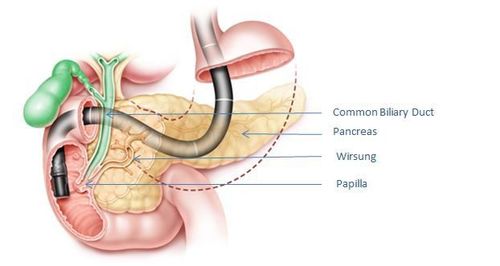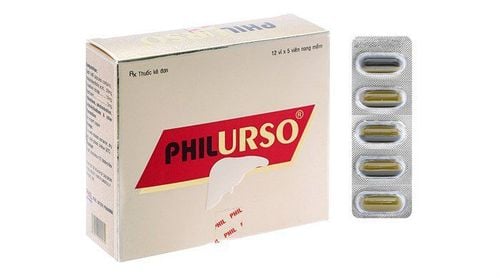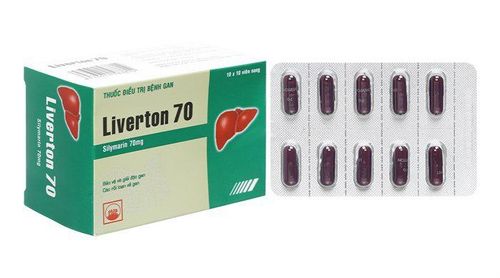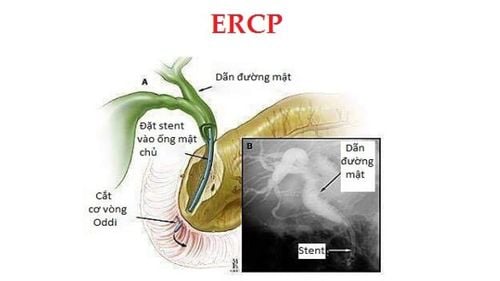This is an automatically translated article.
This article is expertly consulted by MSc Nguyen Ngoc Thang, Department of General Surgery, Vinmec International Hospital Da Nang.Endoscopic retrograde cholangiopancreatography is considered one of the safe and effective methods for the diagnosis and treatment of diseases of the biliary tract and pancreas. However, it also causes many dangerous complications affecting the patient's health after this procedure.
1. What is endoscopic retrograde cholangiopancreatography?
Endoscopic retrograde cholangiopancreatography is an endoscopic technique of duodenum under X-ray light used to diagnose and treat a number of diseases of the biliary tract and pancreas.
The technique is conducted to insert a catheter into the biliary or pancreatic duct through a duodenoscope, through which contrast is injected into the biliary or pancreatic duct for the purpose of diagnosing and treating pathologies of the biliary tract and pancreas.
Currently, the ERCP method is mainly applied to treatment, rarely used for diagnostic purposes because there are many diagnostic methods such as abdominal ultrasound, MRI, CT Scanner,... higher level of safety.
2. Does ERCP have any side effects or complications?

ERCP là một trong những kỹ thuật an toàn và hiệu quả được áp dụng để chẩn đoán và điều trị các bệnh lý của ống mật và ống tụy
ERCP is one of the safe and effective techniques applied to diagnose and treat pathologies of the bile duct and pancreatic duct. However, this technique also causes many complications that need attention:
The most common complication of ERCP is pancreatitis, which accounts for 3% to 7% of patients who have performed endoscopic pancreatitis. upstream password. This condition can be recognized when abdominal pain is more severe and is not relieved by belching or farting; Bile duct infection is also one of the possible complications when performing ERCP, it often occurs in cases of biliary obstruction due to cholangiocarcinoma where after endoscopic retrograde cholangiopancreatography, stents cannot be placed. ; Bleeding may occur, especially when the sphincter of the duodenal papilla is removed. However, this bleeding complication is usually insignificant and will resolve on its own; Injury to the intestines, bile ducts, or pancreatic ducts caused by the endoscope; the most serious complication caused by the endoscope is perforation or tearing of the esophagus, stomach, small intestine, or bile ducts; Aspiration can occur when food from the stomach backs up into the throat and is inhaled into the airways, causing difficulty breathing or pneumonia; Complications related to anesthesia such as hypotension, respiratory failure, cardiac arrhythmia or cardiac arrest, nausea or vomiting. The risk of complications is higher for patients in poor health.
3. Management of complications caused by ERCP method

Kỹ thuật nếu được thực hiện bởi các bác sĩ có chuyên môn cao, giàu kinh nghiệm cùng với trang thiết bị hiện đại thì nguy cơ biến chứng
If bleeding occurs during the procedure, it can be treated with endoscopic techniques such as hemostatic clamps, injection of epinephrine (vasoconstrictor), or the use of an electrocautery; Avoid complications of bile duct infection by giving the patient antibiotics during the procedure and for a few days after the ERCP; Aspiration is one of the possible complications when performing the procedure, to limit this complication the patient needs to fast for 6-8 hours and not drink water or any other liquid within 2 hours before. when performing an ERCP procedure; Administer fluids, administer oxygen to the patient for anesthesia-related complications. Summary: Endoscopic retrograde cholangiopancreatography also causes many dangerous complications affecting the patient's health, but these complications are rare, so patients do not need to worry. If this technique is performed by highly qualified and experienced doctors with modern equipment, the risk of complications will be greatly reduced.
4. Where is endoscopic retrograde cholangiopancreatography to reduce the risk of complications?
Performing ERCP procedure at Vinmec Da Nang International General Hospital allows safe endoscopic diagnosis and treatment under sedation, helping patients no longer be afraid of endoscopy with the most modern technical machines. Highly professional skills, modern equipment and standard procedures here will help minimize complications when performing this technique.
ERCP procedure performed at Vinmec Da Nang uses a modern soft endoscopic system, Endocut electric knife has the advantage of not causing pancreatitis, pancreatic reaction that other hospitals in Da Nang do not have this system.
Especially, Vinmec Da Nang has a team of leading prestigious doctors, well-trained with experience of over 1000 surgeries, specifically:
Master, Doctor Nguyen Ngoc Thang with 17 years of experience in the field gastrointestinal and hepatobiliary surgery, and has over 09 years of endoscopic interventional experience, especially the technique of endoscopic retrograde cholangiopancreatography (ERCP); Master, Doctor Duong Xuan Loc with more than 12 years of experience as a Gastroenterologist. The surgeons are all highly skilled people, making the surgical and post-operative process painless; Professional and dedicated patient care team.
Besides, at Vinmec Da Nang, we always ensure to follow strict principles in sterilization and disinfection to prevent the spread of pathogens through endoscopes for patients and medical staff.
Please dial HOTLINE for more information or register for an appointment HERE. Download MyVinmec app to make appointments faster and to manage your bookings easily.













